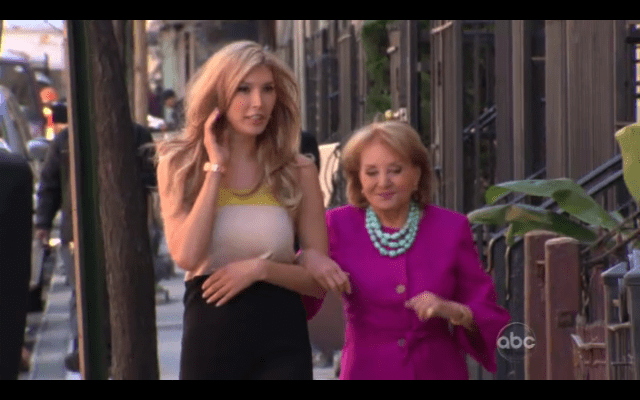“Tonight you’ll hear all the details of Jenna’s sexual transformation,” Barbara Walters promised Good Morning America audiences on Friday morning after running some clips of that evening’s 20/20 exclusive interview with transgender Miss Universe contestant Jenna Talackova. If you think “sexual transformation” is a strange and inaccurate thing for Barbara Walters to say, just wait ’til you see the entire interview!
But first — the story, if you’re not already familiar with it, is that Jenna Talackova had been selected to compete in the Miss Universe Canada competition, but was then disqualified due to her transgender status. GLAAD, along with a lot of other people, fought back against the discriminatory action, and Donald Trump took a break from being an insufferable disgusting excuse for a human being and benevolently invited Talackova back into his fabulous pageant and the obnoxious gender norms it promotes. (In fact, it seems controversy has been Donald’s #1 tactic for getting people to care about his pageant these days — see also: Carrie Prejean‘s idiocy and racy photoshoot, Rima Fakih‘s partying and pole-dancing, Tara Conner‘s cocaine usage and girl-on-girl makeout excursions, etc.)
Although this unsurprisingly wasn’t mentioned in the 20/20 interview (we need all the time we can get to talk about genitalia!), Talackova’s family comes from the Babine Nation, an indigenous native community in Canada who live in Burns Lake, British Columbia. The Lake Babine Nation raised $2,500 to help Jenna with her entry fee for Miss Universe, and her cousin, a band councillor, told The Vancouver Sun: “We’re supportive of her. (Transgender people) are all over the world.”
Talackova’s story had been gaining traction all week, but I hadn’t realized it had gained this kind of national attention until it literally appeared on the television — there Jenna was, talking to Barbara with her Mom and with her prominent Los Angeles attorney Gloria Allred, known for her work on high-profile women’s rights and gender discrimination cases.
Here’s the show:
“I think what’s been the most striking for me is how positive the media coverage of this whole story has been (for the most part),” transgender advocate and writer Annika Penelope told me. “I really can’t imagine all of this happening five or ten years ago. It was on the front page of The Seattle Times at one point, so I know that my parents must have seen it.” Annika’s parents, unlike Jenna’s supportive family, cut off contact when she came out as trans to them. “It makes me wonder how they react to increasingly positive/sympathetic coverage of trans women.”
Laverne Cox, an African-American transgender actress/producer, wrote about Jenna earlier this week on The Huffington Post. Cox admitted she’d initially taken Jenna’s disqualification blithely, then realized that her reaction was perhaps indicative of some internalized transphobia and the complacency with the status quo that comes with years and years of always being treated like “less than.” Fighting back against that idea, she declared: “We need not settle for crumbs. We need no longer hide for fear of the discrimination Jenna experienced. We can say ‘No more.’ We can say being transgender is beautiful, and we have the right to dream. The revolution doesn’t happen alone.”
Coincidentally, earlier this week Autostraddle’s Calendar Girl for April, Morgan of Translabrynth, shared a similar sentiment when talking about the experience of being an Autostraddle Calendar Girl: “If someone wrapped me in a sash and put a mic to my lips right now, though, I’d say my dearest wish is to see more transfolk doing modeling, because every beautiful one of us deserves the feelings I had while on this photo shoot.”
Transgender writer and trans advocate Janet Mock wrote a moving article on her website, Girls Like Us, concluding: “Jenna, by fighting against this prejudice and shortsightedness, you uphold characteristics that show you are way more than a beauty queen – you are a champion for thousands of girls like us, seen and unseen, who hope to one day shine just as bright as the diamonds shining in that crown you so deserve to compete for.”
Jenna’s story is one that taps into a longer tale about how underrepresented and oppressed groups of women fight not only for civil rights and acceptance from friends/family/society, but also for the right to be judged and accepted by the mainstream as “beautiful.” As antsy as normative standards of beauty make many feminists feel, Laverne Cox, Morgan and Janet Mock point out that inclusion in spaces that traditionally honor cisgender women can feel really fucking awesome.
This seems to be a running theme for women — when society judges a woman’s worth by her physical appearance, looking normatively “hot” is, sigh, power. The women who often make initial headlines for neglected women’s causes or neglected subpopulations of women (ethnic groups, disabilities, body types, etc.) generally still conform to standard beauty ideals, from Gloria Steinem to Tyra Banks to Marlee Matlin to Portia DeRossi. Privilege is an opportunity (often an obligation) to do more to help those born without it. Is “hotness privilege” a thing? Maybe it should be.
Which brings us to last night on 20/20!

Barbara opened the segment with the obnoxiously tacky, “We all know that many beauty pageant contestants have had enhancements done to their bodies to become even more shapely, but probably none of them have had as much work done as Jenna Talackova.” FANTASTIC! And we’re off!
Within the first 45 seconds of her interview, Barbara asks Jenna, “You were born a boy, what was your name as a boy?” We then zip over to Barbara and Jenna watching videos of Jenna as a little kid on a computer, with Barbara noting “You were a very cute little boy, Jenna.”

Barbara: “Jenna, when did you first know that you were different?”
Jenna: “I just always knew that I was not what they were saying. It wasn’t right, I thought that I was in the wrong body. I was really confused because they kept telling me was a boy, but I was really attracted to everything feminine…”
Despite my genuine desire to hear more about the development of Jenna’s conception of her own gender, Barbara Walters has no such patience, obviously we must tackle the pressing question of where Jenna urinated in high school.
Barbara: “Did you use the boys bathroom or the girls bathroom?”
Jenna: “I used the girls bathroom. They were very supportive at my school.”
Jenna explains that she began transitioning at 14 when her doctor put her on hormones (estrogen) and at 19, she was given the letters she needed from psychologists to have gender reassignment surgery (or “sex surgery” as Barbara Walters calls it).
Mom: “You hear stories of kids being beaten up, you know lured into things and stuff — so that was really — a lot of these things went through my mind.”
Barbara: “Were you ever beaten?”
Jenna: “No, I was never beaten.”
Barbara: “Just name calling?”
Jenna: “Just name calling. ‘It’ is used a lot, ‘tranny’…”
As much as anybody who has read the statistics about how transgender kids are treated in school (for example, that more than half of trans kids who were bullied have attempted suicide) would love to know more about Jenna’s school environment, Barbara has some “tough questions” that “people really wanna know” for us:
Barbara Walters: “I’m gonna have to ask you some tough questions, people really wanna know — part of the sex surgery is that the skin of the penis is used to create what appears to be a vagina, is that correct?”
Jenna: “That’s correct.”
Barbara Walters: “That must have been terribly painful.”
Jenna: “It was terribly painful, but seeing something on your body for that long and not being able to look at myself in the mirror because I couldn’t stand seeing the other part, it was actually very rewarding, too.”
For her part, Jenna didn’t seem uncomfortable discussing anatomy, and gamely fielded questions about breast implants and having her Adam’s Apple removed and how starting the estrogen so young helped with her voice. Oh right, and then this:
Barbara Walters: “So if I saw you undressed you would look like a woman to me, totally? Yes?”
Jenna: “Of course.”
Barbara Walters: “The Canadian government recognizes you as a female.”
Jenna: “Oh, undoubtedly, there’s no trace.”
Media about transgender people is often critiqued for its obsessive focus on the biological aspects of being trans, and when trans women are concerned, the focus is often equally split between the biological body and the “accessories” of womanhood like makeup and dresses. That being said, the context in which Jenna is being discussed is The Miss Universe Pageant, in which all women are assessed based on their bodies, makeup and clothing — but for real, we all know Barbara Walters would be asking ten thousand invasive questions about Jenna’s genitalia regardless of context.

But now that Barabara has already asked how Jenna’s vagina got built and what she looks like naked, let’s get to the next potentially subversive topic —
Barbara: “Are you attracted to men or to women?”
Jenna: “I’m attracted to men. I have a partner.”
Barbara: “You have a boyfriend who knows that you are transgender.”
Jenna: “Yes, he’s very supportive, the same age as me, just an amazing man.”
Barbara: “Did you meet him before or after your surgery?”
Jenna: “After.”
The fact remains, however, that by reducing Jenna’s gender identity to her anatomy and attire, 20/20 is reinforcing erroneous and damaging ideas about gender being defined simply in physical terms when the lived experience of gender is about a lot of things before the body even comes into play (prominently what trans activist Julia Serano calls “subconscious sex“).
20/20′s focus on gender reassignment surgery as an essential element of the transition was problematic as well. As Annika told me: “While it’s great that Jenna was able to justify her gender by assuring everyone that she’s had bottom surgery and by producing legal documents and lots of pretty, airburshed pictures, it makes me wonder what the implications are for the significant number of trans women who can’t afford the privileges of health insurance, legal gender change, or facial surgery. Would they still be allowed to compete? And, more importantly, would the media rally around them?
Barbara then brings out Gloria Allred, Jenna’s attorney, first flashing to a news conference in which Gloria said the following to the press, because she rocks:
Gloria: “She did not ask Donald Trump to prove that he was a naturally born man, or to see pictures of his birth, or to see his anatomy to prove that he was male.”
Donald Trump probably secretly wishes he was a midwife and now is attempting to live out his dream by harassing other people for their birth videos, he’s very into these birthing conversations.

Back to the Barbara/Gloria bit:
Barbara: “Gloria, was Jenna under any legal obligation to say that she was transgender?”
Gloria: “None whatsoever. She is legally a female. She is recognized in Canada as a female, on her drivers license, on her passport, and on her birth certificate. And she is female.”
And then:
Barbara: “Gloria, you take on a lot of important cases, why did you take on this case?”
Gloria: “Because what happened to Jenna is very very important. The Miss Universe competition had the rule that a contestant had to be a naturally born female. That is a rule that is blatantly discriminatory, and she has been standing up against it because she doesn’t want what happened to her to be endured by anyone else… I am so proud of Jenna because she has fought to eliminate this rule; this rule which, if it remains, would have an impact not only on Jenna but on others as well.”
We then flip to an interview with Donald Trump, who I find physically and mentally repulsive to a degree that I can hardly look at the screen when his face is on it:
Barbara: “In the future, can transgender women compete in Miss Universe?”
Donald: “Yes.”
Barbara explains that they thought the fight was over after Donald let Jenna back in, but that “Donald being Donald” has now slightly backed up from his initial message of acceptance. Yup, Donald suspects Jenna has a subliminal message she’s attempting to spread via the secret code embedded in her name:
Donald: “I looked at her name and somebody brought this up to me. Genital. Those are the first letters of her name. Jennatal. And I’m saying to myself, hm, that’s strange. Could there be an ulterior motive?”
To illustrate his point, Trump spelled it out on a piece of paper:

Jenna rolls her eyes and Gloria explains:
Gloria: “…with all due respect to Mr. Trump, he really needs to stop being focused on genitals, his or anyone else’s. This world does not revolve around his penis or anyone else’s genitalia. Whether a person is a woman is not simply defined by her genitalia.”
Thank you Gloria Allred!
But Barbara has to ask:
Barbara: “You wanting to compete is because you are beautiful and wanted to win a contest, or because you were trying to make a statement?”
Jenna: “Because I’m a woman, and I feel like the universe — the creator — put me in this position as an advocate… and I’ll take that postion if it’s helping anybody else– my story and my actions — then I feel great about it.”
The takeaway from Barbara’s interview seems to be that there’s no need to panic, transphobes of America! — Jenna’s not “hiding a penis,” she doesn’t have a “political agenda,” she’s heterosexual and she has a boyfriend who knows she was “born male.” Surely somebody could’ve googled the GLAAD media reference guide? I hear they have a healthy budget over there at ABC.
Anyhow, it’s an 11-minute bit on a mainstream television series, and despite Barbara’s effemimania and ability to do everything short of using the wrong pronouns to rub me the wrong way, it seems like the general consensus is that Jenna Talackova’s visibility is a good thing. It starts a conversation. As Annika said (admittedly having not yet seen the 20/20 piece specifically), “any positive trans* visibility in the eyes of the general public is good for the cause.”
Even a quick perusal of “Jenna Talackova” tagged posts on tumblr recount people all over the country talking to their families after or during the airing of the 20/20 piece — but it reveals a lot of transphobia, too. A similar mix of support and transphobia riddles the Miss Universe Canada Facebook Page.
Nick Matte, a professor of Transgender Studies at The University of Toronto, spoke to CTV earlier this week and made this incredibly important point:
“…(Jenna’s story) has this broad appeal because historically women and femininity have been hyper-scrutinized… so questions of normative femininity are coming in strongly here… She’s very thin, very busty, she looks white, she has blond hair, she’s meeting ideas of what “the best kind of woman” looks like socially and indeed, even in her statement they were saying “to anyone with eyes” or “anyone who knows her, she is clearly a woman.” And I would say that’s a conservative statement on who should be allowed to have rights that are gendered and who should be included in gendered social activities. So she’s able to draw on some of our perceptions in that most people would look at her and say “yes that’s a woman,” I would argue that those kinds of rights shouldn’t be limited to normative representations.”
Here’s two places to start:
+ In Germany, an 11-year-old trans girl has been forcibly institutionalized due to her expression of her gender, and will not be released until she conforms to the male gender. There is a petition going around that you need to sign.
+ Also in Canada, Bill C-279, which would add gender identity and gender expression to the list of statuses protected under the Canadian Human Rights Act, and in court, opponents are trotting out some pretty nasty falsehoods to keep this from passing. In six weeks, another debate and a vote will be held, so if you’re in Canada you should get in touch with your MP and tell them to support C-279 and also, sign this petition.







